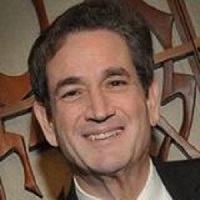By Rabbi Ben Kamin

ENCINITAS, California — My mother and father, impossibly attractive as newlyweds, impossible as parents, are both gone. But I routinely meet them in too many nightmares of his premature death, her refusal to love, and their cosmic failure to live up to the imagery their three children would conjure up about them.
It’s not something that you receive, like a text message, or a certified letter, at, say 10:07 AM on a Tuesday. It’s a creeping, incremental awareness, a ghostly, ghastly series of howls and whispers and missed opportunities; vicious mistakes this one and that one and you yourself made four months, six years, even thirty years ago; a pile of resentments and seriously psychotic errors committed by people that were thrown together by biology and fate and who now, sadly, tragically, dynamically, are at clinical war with each other.
My brother and sister and I were emotionally orphaned long before our chemically depressed parents and their delusions and indulgences left this earth. We live in the cavity of our parents’ failure to genuinely care for each other and their children and we are unable to form a tender circle around our own collective crop of their disconnected grandchildren.
Privacy issues will prevail here, obviously, but when a man approaches his 62nd birthday, albeit cheerful in his own personal life and career work, creative, and yet still finds that the primary source of any stress remains his birth family and its surviving members—that’s dysfunction, that’s old, and that’s tiring.
One of the overriding commonalities of this, as one sips red wine and commiserates at dinner parties with other aging baby boomers amid their own “sandwich generation” stories and grievances and umbrages (and the occasional tender narratives that make most of us envious), is how universal this is.
Everybody seems to have a sister or a brother they can barely even discuss, though they do with unbridled vehemence and hurt and dismay. Sibling estrangement, well-known to me, and so deeply set into my physiology that it is part of the chemistry of my spleen, is nonetheless better accepted than constantly rationalized; even the early Bible overflows with such accounts and, true to life, none are ever fully resolved.
In varying degrees, no one is fully guilty and no one is sweetly innocent in these sad, sometimes biblical conflicts that are attendant to the DNA’s of assorted family groups. Parenting skills are not necessarily parceled out to people just because they are parents; favoritism, vengefulness, and a litany of insecurities are transferred from one era to the next and a new generation of children suffer grievously as they become adults and parents having inherited the reassignment of a lot of anxieties and neuroses.
The early and sudden death of a parent, as was the case in my family, exacerbates the complexities and sharpens the edges; woe unto the countless families who really were not prepared or equipped to deal with such a calamity.
A real symptom of family dysfunction is the invariable declarations of “I won’t do such-and-such until so-and-so apologizes to me!” Now, apology is an act of grace and dignity in human life that is often in order but is surely best received when self-initiated. Legislated as a conditional statute among historically bickering family members already laboring under years of aberrational thinking, suspicions, and jealousies, it serves only to raise the temperature and deepen feelings of guilt and inadequacy.
I hope I’m doing okay with my own children and stepchildren. Safe to say that nobody is owing anybody an apology and we travel together well and we all enjoy talking, board games, the movies, a spontaneous meal out, keeping a bit of distance from one another’s business, and nobody can even recall the last time somebody was screaming or slamming doors from one generation to the next. We’re not perfect, but we’re not percolating, either. My parents, my roses fraught with thorns, taught me to do a better job from the reverse.
*
Rabbi Kamin is an author and freelance writer. Your comments may be posted in the box below or sent directly to the author at ben.kamin@sdjewishworld.com